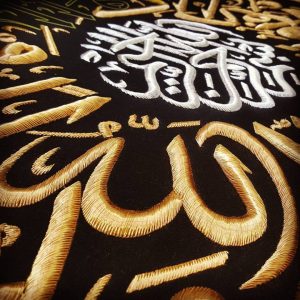
The concept of Khuld [permanence] and Adan [perpetuity] is central to human nature especially when there is total absence of hardship and discomfort in life. In reality, the good times never roll forever but human beings are always in search of peace and pleasure and are ready to pay any price they can afford to prolong it as long as and as far as they possibly can.
When Adam was created by the Good and Glorious Allah Subhanuhu wa Taala and provided the blissful company of Eve to live in Paradise as the vicegerent of Allah, he had everything to be happy about. Yet he needed a second assurance that these good times will not be short lived but will last forever.
Perhaps this was Adam’s only worry in divine luxury and comfort. This was the soft spot where Adam’s arch enemy, Shaitan, attacked him with sweet talk. Burnt by Allah’s rebuke to him for not prostrating before Adam, Shaitan had declared his sworn enmity to Adam and promised to Allah that he will lead Adam to a life of sin and disobedience so that he too earns divine condemnation and falls to disgrace. Shaitan promised to approach Adam and his progeny from all sides – right, left, front and behind – to ensure that Adam swerved away from the right path and became disobedient and lacking in his total submission to Allah.
Allah Subhanuhu wa Taala granted Shaitan his wish to be free to beguile Adam and his progeny howsoever he chooses to, but Allah also added the condition that He will fill jahannam with both Shaitan and sons of Adam whoever follows him in his footsteps. Allah said: “most certainly will I fill hell with you and such men who shall follow you, all together” 38:85.
Shaitan therefore approached Adam in Paradise with the pretence of disclosing the secret of ‘everlastingness’. He said to him:” “O Adam shall I lead thee to the tree of eternal life, and thus to a kingdom that will never decay”. (2:106). This concern being Adam’s only weakness, he and Eve fell for it instantly and followed Shaitain’s direction to taste the forbidden tree. And that’s how Adam’s fall happened.
Later Adam and Eve repented and were pardoned by Allah but were ordained to live a short span of life on earth where they would live, grow old and die and will be raised again to be presented before Allah on another earth on the Day of Judgement when Allah will decide their final abode on the basis of their individual record of deed hanging from their necks like an open scroll.
In the holy Quran, Allah has made the concept of everlastingness or perpetuity a constant theme to satisfy our curiosity for finding the secret of permanence. This curiosity is further sharpened by the reality of death which spares no living being, whether powerful or weak, young or old, criminal or saint.
There are 86 verses in the holy Quran spread over 37 chapters where the words khalidoon, khalideen or adan [meaning everlastingness or perpetuity] are mentioned. Of these, bout 34 verses relate to the perpetual nature of punishment for being Shaitan’s followers. 49 verses are about Everlasting Paradise or Perpetual Gardens of Bliss. That indeed is the answer to the secret of everlasting life.
References
Al-Baqara (The Cow) > [2:81] [2:82] [2:257] [2:275] [2:39] [2:25] [2:217] [2:162]
Al-Imran (The Family of Imran)> [3:15] [3:88] [3:107] [3:116] [3:136] [3:198]
An-Nisa (The Women)> [4:13] [4:14] [4:57] [4:93] [4:122] [4:169]
Al-Ma’idah (The Table Spread) > [5:80] [5:85] [5:119]
Al-An’am (The Cattle) > [6:128]
Al-A’raf (The Heights) > [7:20] [7:36] [7:42]
At-Tauba (The Repentance)> [9:68] [9:17] [9:22] [9:100] [9:63] [9:72] [9:89]
Yunus> [10:26] [10:27]
Hud (The Prophet Hud)> [11:23] [11:107] [11:108]
Ar-Ra’d (The Thunder)> [13:5]
Ibrahim (Abraham)> [14:23]
An-Nahl (The Bee)> [16:29]
Al-Kahf (The Cave)> [18:108]
Ta-Ha> [20:76] [20:101]
Al-Anbiya (The Prophets)> [21:99] [21:102] [21:8] [21:34]
Al-Mu’minun (The Believers)> [23:11] [23:103]
Al-Furqan (The Criterion)> [25:16] [25:76]
Al-‘Ankabut (The Spider)> [29:58]
Luqman (Luqman)> [31:9]
Al-Ahzab (The Confederates)> [33:65]
Az-Zumar (The Groups)> [39:72] [39:73]
Ghafir (The Forgiver)> [40:76]
Az-Zukhruf (The Gold Adornments) > [43:71] [43:74]
Al-Ahqaf (The Curved Sandhills) > [46:14]
Muhammad > [47:5] [47:15]
Al-Fath (The Victory) > [48:5]
Al-Hadid (Iron) > [57:12]
Al-Mujadilah (The Disputation) > [58:22] [58:17]
At-Taghabun (Loss and Gain) > [64:10] [64:9]
At-Talaq (The Divorce) > [65:11]
Al-Jinn (The Jinn) > [72:23]
Al-Baiyinah (The Clear Evidence) > [98:6] [98:8]
Ar-Ra’d (The Thunder)> [13:23]
An-Nahl (The Bee)> [16:31]
Al-Kahf (The Cave)> [18:31]
Maryam (Mary)> [19:61]
Fatir (The Originator of Creation)> [35:33]
Suad> [38:50]
Ghafir (The Forgiver)> [40:8]
As-Saff (The Row) > [61:12]
Yunus> [10:52]
Ta-Ha> [20:120]
Al-Furqan (The Criterion)> [25:15]
Fussilat (Explained in Detail)> [41:28]

Leave a Reply